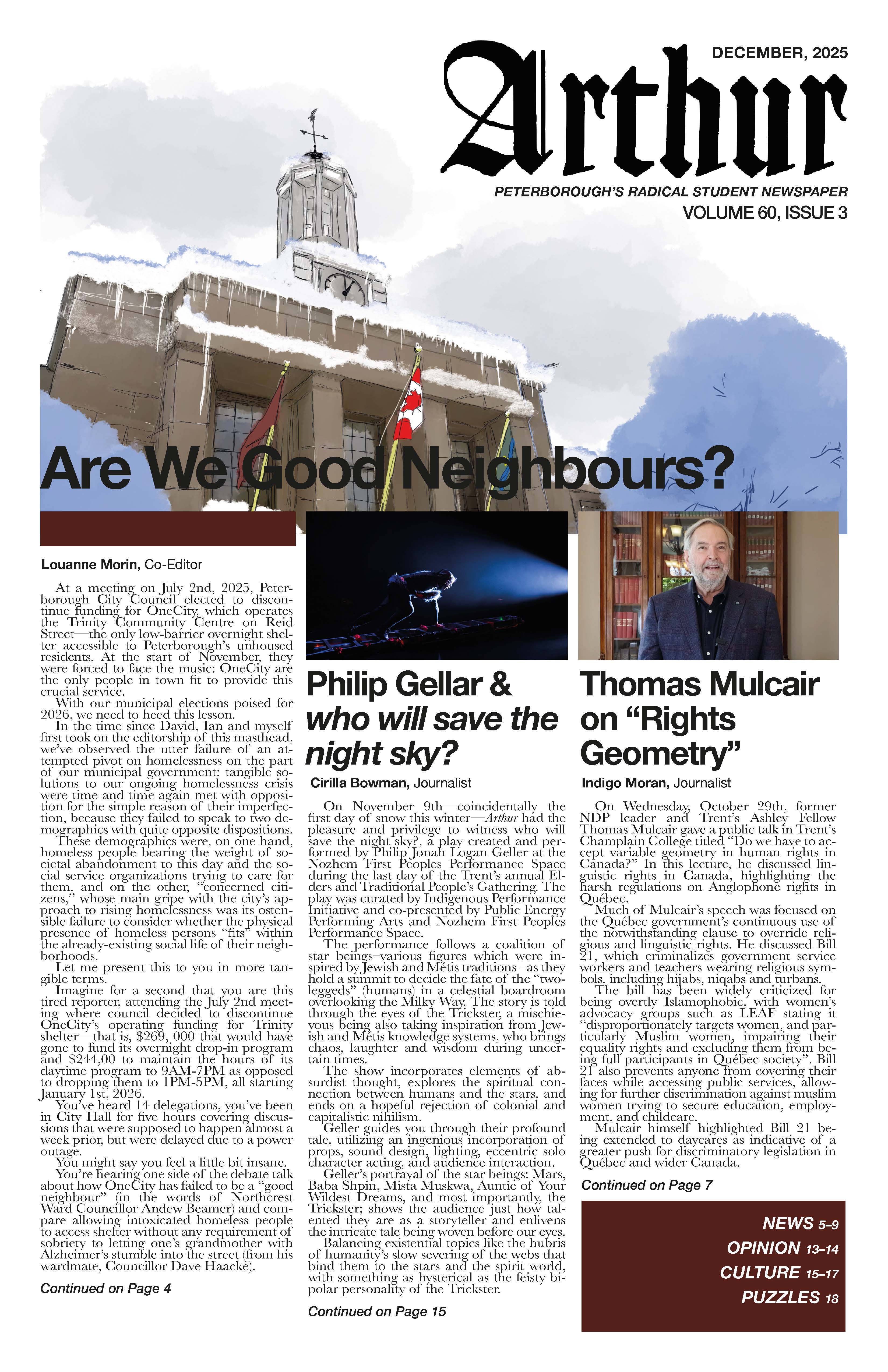As I write these words, the Flying Burrito Brothers echo through the Arthur office. It is fitting that a band with a member lovingly known as “Sneaky” Pete would provide the perfect epigraph for an article about a former member of the Ford government and Trent University’s seemingly endless ability to embarrass itself while sending a strong message to its students.
For those who may not yet be aware, Former Ontario Minister of Health and Deputy Premier, Christine Elliott, will receive an honourary Doctorate of Laws on June 16th as part of Trent Durham’s convocation ceremony.
From the outset, it would seem Elliott stands out from the other honourary degree recipients in that there seems to be no really obvious or consistent facet of her career which speaks to, or is informed by, what Trent University as a whole pretends to stand for as an institution of learning, curiosity, and compassion—which might actually be the point.
This article isn’t going to be about debating whether or not Christine Elliott “deserves'' an honourary degree. That kind of boring partisanship serves no real purpose here and could equally be weaponized against any of the other recipients here at Trent, or honourary degrees at any other university anywhere. I’ll be the first to admit that her charitable involvement is significant, but I would argue is not what she is primarily known for nor does it absolve her of her decisions and actions in public office.
It is more so about attempting to deconstruct the message the awarding of an honourary degree sends to current and past students of Trent and what it says about the values of Trent as an institution.
In essence, it poses a series of questions: What can we learn from this choice to recognize someone with the political baggage of someone like Christine Elliott? At what point does this become a tacit endorsement of the policies of the Ford Government? And why, dear God, would a place of higher learning consider this a good idea?
To begin, it is clear from the outset that the awarding of honourary degree is part of how the university constructs and moulds its public relations strategy. Who the university chooses to invite into its circle of alumni is a potent indicator of how the institution is attempting to craft its image.
Over the past couple years, I’ve made a bit of a habit of lampooning the senior administration of this institution for their perpetual inability to express a coherent opinion on anything remotely resembling a vision for Trent, beyond platitudes and empty promises hinged upon the latest Mclean’s rankings, which stand at odds with the university’s own internal calculation of student-faculty ratios.
In many ways, this decision goes some way to confirming my suspicions about Trent University. The awarding of an honourary degree to someone so strongly aligned with and complicit in outright attacks on education and healthcare in this province, who stood by as thousands of vulnerable people needlessly passed away in Long Term Care Homes over the course of the COVID-19 pandemic, and repeatedly and vindictively passed anti-constitutional legislation freezing public sector wages, is actually largely congruent with my experience as a graduate student at this institution.
Now, however, they’ve decided to flaunt it shamelessly.
In 2023, a total of four individuals are receiving honourary degrees from Trent. They include Drew Hayden Taylor, a renowned author, playwright, filmmaker, and journalist from Curve Lake First Nation. As a poignant reminder of the role of humour in healing and having difficult conversations about the true colonial history of this land, Taylor’s work speaks directly to the aspirations of Trent’s various reconciliatory initiatives and programs vested in that ethic.
I’m frankly shocked it took this long for Trent to grant this honour to Taylor, whose contributions to the cultural life of Canada at the community and national level largely speak for themselves as reasons why he should be forever symbolically associated with Trent through receiving this honour.
Along the same lines of highlighting some form of reconciliation as both a tangible and aspirational value to strive towards, Master Warrant Officer Moogly Tetrault-Hamel has worked within the Canadian Armed Forces and Department of National Defence for over two decades where he has worked to improve the accessiblity and presence of Indigenous knowledge within these institutions. Additionally, his work has highlighted concerns around workplace equity and mental health. Again, it’s difficult to miss the message being sent by Trent here: they want to care about those individuals who are working within systems to make change and create more inclusive, equitable spaces. That is an honourable pursuit.
Another local recipient of an honourary degree is Dr. K. Jennifer Ingram, a physician and researcher who specializes in geriatric medicine and dementia care. Trent is unique as it is home to a centre devoted to research concerning aging. Peterborough is also home to a higher than average population of seniors—a fact which was again brought forward to City Councillors at a recent meeting.
Honouring an individual for their life devoted to researching and providing care for a growing and historically invisible portion of the population across Canada is not only important from the point of view of concern for the health of society, but it also goes a long way to strengthening community and research partnerships within the city itself.
It’s not a question with these individuals whether or not Trent, and any other right-thinking individual, would look at the achievements and focus of the life-work of these people and understand them to be categorical examples of what we should value as a community and a country. Each has, in their own way, moved important conversations about marginalized populations forward and brought them to bear on the institutions which have played a role in creating and maintaining barriers.
Now things get weird. Christine Elliott, who served as an MPP from 2006–2018 in ridings surrounding Trent’s Durham campus, has made a career aligning herself with a party which has done nothing over their past five years in government to better the lives of marginalized communities in this province.
In reality, quite the opposite is true.
She did so not as a back bencher, but as a three time failed Progressive Conservative leadership candidate in 2009, 2014, and 2018. Her last kick at the top job saw her challenge the legitimacy of the leadership outcome (she did win the popular votes, after all) only to then successfully seek election in the riding of Newmarket—Aurora following a colleague’s being disqualified for signing up members for the PCs, primarily seniors and disabled people, without their knowledge. Following her win, Elliott was accepted into the position of Deputy Premier and Minister of Health within the newly formed Ford government.
In each instance, Elliott would pit herself as a rational, centrist option to the other candidates. But when she realized, after the third attempt, that the average PC voter is neither rational nor centrist, she dutifully went all-in on the shameless powergrab which will now forever define her political career.
Effectively, Elliott became and proudly served as Doug Ford’s lap dog from 2018 until 2022 when she decided she would not seek re-election after overseeing what can only be described as a chaotic and bumbling response to the pandemic, which saw the government continually re-open too early before bashfully walking back their decision—all the while feigning surprise and something like consternation and worry about the state of the province.
As Health Minister, Elliott saw to the cuts to public health across the province in the year before the pandemic and significantly reduced oversights and inspections of nursing homes the same year. Official reports by the Canadian Military published in 2020 and 2021 clearly outlined the fact that the conditions in the Long Term Care homes, which they were called into to help manage the mass death events unfolding in them, were in a state of disastrous disrepair, with more patients dying of neglect than COVID-19.
In 2022, a report of the Financial Accountability Office found that the Ford Government had withheld $1.8 billion in health care funding amid a further $7.2 billion in underspending across various government programs, including education. Earlier this year, that same office found that the Ford government will incur a spending shortfall of $5 billion in healthcare and $1 billion in 2024 if the current rates of underfunding continue.
The effect of this continues a trendline from Elliott's time as Health Minister, which saw the intentional and malicious underfunding of public health and education, effectively starving these resources of their viability.
She stood by as public sector wages, a segment of the workforce which includes healthcare workers, had their wages frozen during collective bargaining, and passed legislation which effectively paved the way for the current Minister of Health, Sylvia Jones, to abdicate her responsibility to ensure equitable access to healthcare and allow for the privatization of publicly funded operations across Ontario.
Christine Elliott, to put it bluntly, has blood on her hands. Not real blood, of course—she leaves that to the professionals for which her actions and unabashed hard-on for power scream nothing but contempt. She quite literally stood by, enabled, and enacted the worst impulses of Doug Ford during her time in government, and once the pressure got to be too much, she jumped ship in something resembling disgrace.
Trent University’s official reasoning for granting this honourary degree is due to Elliott’s being a "passionate advocate for vulnerable community members." The citation then lists a number of associations she had worked with as a board member or volunteer outside of her political career. This is something I cannot and will not discount. It is absolutely true that Elliott, and her late husband and former Harper Cabinet Minister, Jim Flaherty, have always been deeply involved in charitable endavours which help to support the needs of disabled individuals and especially children. That is beyond reproach.
However, in granting an honourary degree for this and only quickly mentioning her political career, Trent is attempting to re-write and re-frame Elliott’s career and character to suit their own ends now that she has left public life.
This isn’t a poor reflection on Christine Elliott, this is a poor reflection on Trent.
Reasonable people can disagree with my characterization of Elliott as Ford’s lap dog, and perhaps even attempt to lay blame for the devastation of the healthcare system in Ontario under her watch on previous governments. This is important and worthwhile dialogue in a free and democratic society.
What is beyond arguing is the fact that Trent seems justified in granting an honourary degree to someone while obfuscating that same person’s tangible complicity in harmful government policy. The inability of Trent to even mention Elliott’s role as Minister of Health outside of the COVID-19 pandemic speaks for itself. It’s absolutely true she was “integral in overseeing the province’s response,” but that’s like saying my 2009 Dodge Calibre was integral to the overseeing of a squirrel’s death last weekend—of course it’s true, but I think any reasonable person would be disgusted with such a cold and uncritical assessment of that truth.
It is hard to conceive of a way that this honourary degree is not a tacit endorsement of Elliott’s politics and, by extension, the Ford government—though it seems Trent would rather us not think about that. Unfortunately, through this decision, Trent has cast itself in with a party and a government which has systematically worked against the interests of higher education in particular and all levels of education writ large.
As such, there is really no other conclusion to be drawn from this decision other than the fact that Trent believes as much in the ongoing ruination of public healthcare and education as it does in the efforts of Indigenous creators and leaders, and the promise brought on by research into vulnerable populations. Until I become aware of some monumental, and staggeringly public, moral failing or destructive tendency which erodes our social fabric in any of the other recipients of honourary degrees this year, I will continue to hold that granting an honourary degree to someone based only on a sliver of of their career is a bad precedent to set.
All this being said, this decision sends a very strong message to the students of Trent and all alumni if they are listening. And so with that, I wish to congratulate the leadership of Trent University on their decision to finally quit pretending they have the best interests of students at heart.
I’m sure that’s a weight off of all of our shoulders.


.png)


.jpg)


.jpeg)



.jpg)


.jpg)









.png)